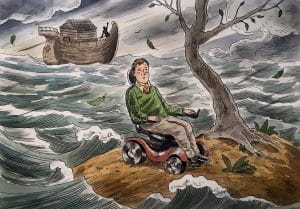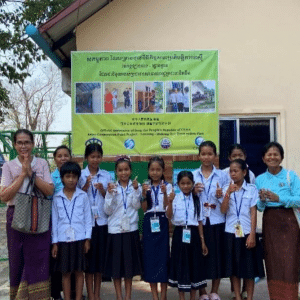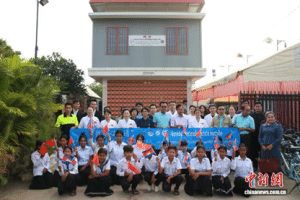Introduction
Climate change is one of the most significant global challenges today, and its impacts are felt unevenly across populations. Among the most vulnerable are persons with disabilities (PWDs), who often face compounded barriers to survival, adaptation, and recovery during climate-related disasters.
In China, a country experiencing both rapid economic development and increasing environmental challenges, PWDs are at heightened risk. This article explores how climate change affects PWDs in China and the role of non-governmental organizations (NGOs) in promoting inclusive strategies for climate action.
Climate Change and Vulnerability in China
China, as one of the largest contributors to global greenhouse gas emissions, is also highly vulnerable to the effects of climate change. Rising temperatures, more frequent extreme weather events like floods and droughts, and sea-level rise are becoming significant challenges for both rural and urban populations. From heatwaves in cities like Beijing and Shanghai to severe flooding in the Yangtze River basin, the risks posed by climate change are increasing.
PWDs, who represent over 85 million people in China, face unique challenges in these situations. Their ability to respond to and recover from climate-related events is often hindered by pre-existing social, economic, and physical barriers. Understanding the intersection of disability and climate change is critical for creating inclusive responses to environmental crises.
Physical Health and Well-being
Climate change directly affects the physical health of PWDs. Extreme heat, for example, poses a serious risk, especially for those with mobility impairments, respiratory conditions, or other chronic health issues. Cities such as Beijing and Shanghai have experienced intense heatwaves in recent years, worsening health problems for PWDs who may have limited access to cooling centers or healthcare.

Similarly, air pollution—worsened by rising temperatures and industrial emissions—disproportionately affects PWDs, particularly those with respiratory conditions. While China has made strides in reducing air pollution, PWDs often face greater challenges in accessing healthcare and social services due to systemic inequalities.
Accessibility in Emergency Response
During climate-related disasters like floods and typhoons, PWDs face significant challenges in accessing emergency services and shelters. Many parts of China still lack infrastructure adapted for those with physical disabilities, including inaccessible evacuation routes and poorly equipped emergency shelters. Communication barriers also exist for people with hearing or visual impairments, particularly in regions where emergency warnings may not be provided in accessible formats.
For instance, during the 2020 Yangtze River floods, many PWDs were left vulnerable due to a lack of tailored evacuation procedures. Government-led emergency responses often overlook specific needs such as mobility aids, accessible transportation, and medical support, all critical for ensuring the safety of PWDs during evacuations.
Social and Economic Vulnerabilities
PWDs in China are more likely to live in poverty, which compounds their vulnerability to climate change. Many rely on social security programs, family support, or informal work, making them financially unstable in times of crisis. Climate change exacerbates these conditions, as natural disasters often destroy livelihoods, agricultural land, and homes. This is particularly true for PWDs in rural areas, where economic opportunities are already limited.
For example, in regions like Inner Mongolia and Yunnan, where agriculture is a primary source of income, droughts and floods have become more frequent, threatening the livelihoods of entire communities. PWDs are often the hardest hit, as they may have limited access to adaptive resources like irrigation technology or government assistance.
Additionally, displacement due to environmental degradation or natural disasters can be especially traumatic for PWDs. Migration to urban areas or relocation within rural regions often results in the loss of community-based support systems, which are essential for their well-being. In China’s rapidly urbanizing regions, the lack of accessible housing and employment opportunities further marginalizes PWDs who are forced to migrate due to climate impacts.
Mental Health Consequences
Climate change also has profound impacts on mental health, particularly for PWDs who are already facing social isolation and stigma. Anxiety, depression, and post-traumatic stress disorder (PTSD) are common among those who experience natural disasters, and PWDs may have fewer coping mechanisms or access to mental health services.
For instance, elderly PWDs who experience frequent heatwaves or floods may suffer from heightened levels of anxiety and helplessness, especially if they lack family support or access to counseling services. China’s mental health infrastructure, while improving, remains largely inaccessible to PWDs, making it difficult for them to receive the care they need.
The Role of NGOs and Strategies for Inclusive Climate Action
To address the challenges posed by climate change for PWDs in China, an inclusive approach is essential. NGOs play a crucial role in promoting these strategies, ensuring that PWDs are not left behind.

- Inclusive Infrastructure: Governments should prioritize accessible infrastructure in both urban and rural areas, ensuring that buildings, transportation systems, and emergency services are designed with PWDs in mind. NGOs can advocate for these changes and collaborate with local governments to provide technical expertise on accessibility. Organizations such as the China Foundation for Disabled Persons (CFDP) and Save the Children have been instrumental in working with governments and communities to develop accessible infrastructure for vulnerable populations, focusing on schools, public buildings, and emergency services for PWDs.
- Disability-Inclusive Disaster Risk Reduction (DRR): DRR plans must consider the specific needs of PWDs, including accessible early warning systems and evacuation procedures. NGOs can facilitate this process by offering training programs, developing inclusive disaster preparedness materials, and working with local communities. Organizations like the China Disabled Persons’ Federation (CDPF) and climate-focused NGOs can integrate disability considerations into DRR strategies, ensuring that PWDs are not overlooked during disaster management planning.
- Partnerships and Advocacy: NGOs play a critical role in forming partnerships and advocating for policy change. Disability rights organizations can collaborate with environmental groups and international NGOs to ensure inclusive policies are at the forefront of national climate agendas. Environmental NGOs such as Greenpeace East Asia could partner with disability advocacy groups to promote more inclusive climate policies in China. These collaborations can ensure that PWDs are included in all stages of climate action, from planning to implementation.
- Social Protection Programs: Expanding social protection programs to support PWDs after climate-related disasters is vital. NGOs often step in where government services fall short, delivering aid to the most vulnerable. The China Foundation for Poverty Alleviation (CFPA), for example, works in disaster-affected areas and could ensure that PWDs are adequately supported in post-disaster recovery efforts by providing essential resources like accessible housing, financial support, and medical care.
- Capacity Building and Community Empowerment: NGOs are essential for building the capacity of local communities and empowering PWDs to actively participate in climate adaptation. International NGOs like Save the Children and local groups such as the One Plus One Disabled Persons’ Cultural Development Center have a strong history of working with vulnerable groups and could extend their expertise to help PWDs in China adapt to the impacts of climate change. By empowering local communities, these organizations can foster resilience and reduce the long-term impacts of climate change on PWDs.
Conclusion:
Climate change presents significant challenges for persons with disabilities in China, exacerbating existing vulnerabilities and creating new barriers to survival and recovery. Addressing these challenges requires a coordinated, inclusive approach that involves governments, NGOs, and affected communities. By integrating disability rights into climate policy and building resilient communities, China can ensure that PWDs are not left behind in the fight against climate change.




